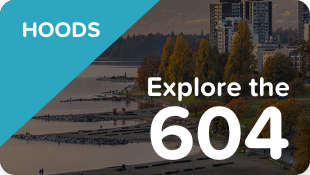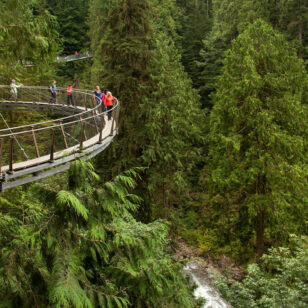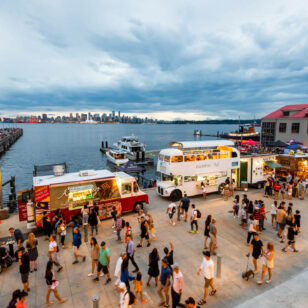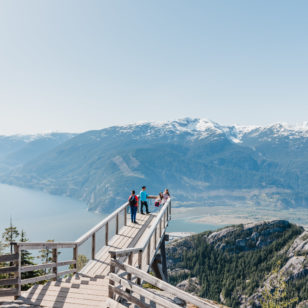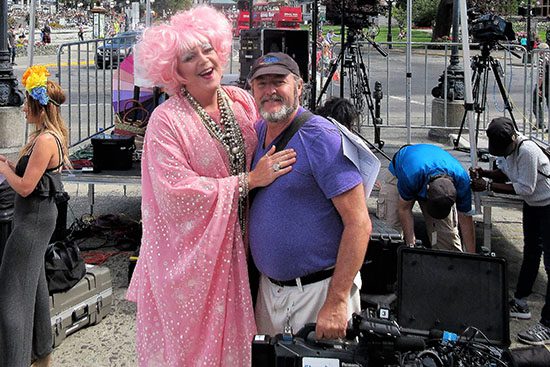
Michael P Keeping with Conni Smudge
An interview with Michael P Keeping (MPK)
By Angus Praught
Michael P Keeping is an award-winning director, producer, cameraman, Foley artist, reporter and teacher in the Canadian television and film industries. He now has over forty years in the industry, but he started his career volunteering for work in film and television productions while still a teenager in Toronto.
Keeping is a Gemini Award winner, and a six-time Leo Award winner. His long list of achievements also includes two Golden Reel Award nominations, two Prix Genie Award nominations, and an additional four Gemini Award nominations for his sound work. The Beachcombers, Highlander, Police Academy: The Series, The New Addams Family, and Ice Pilots NWT, are just a few of the over fifty TV series projects that include his name in the credits.
If you ever wonder about the clip-clopping of horse’s hooves, the eerie sound of creaking doors, or sudden smash of breaking glass in the movie or show you’re watching, there’s a possibility that Mr. Keeping and associates for his company, Trax Stars Entertainment, Inc., are behind the scenes.
Michael is also a pioneer in LGBTQ2+ television in Canada. He was among the first to film the Vancouver Pride Parade professionally, bringing it to mainstream audiences. Today the Vancouver Pride Parade is broadcast internationally. And he was instrumental in coordinating a safe and welcoming learning environment for LGBTQ2+ volunteers with OutLook TV, as a Shaw TV community access program producer, to help get their start in the television industry.
Today we are going to speak with Michael, to get an insider’s glimpse of this fascinating side of the world of television.
AP: Good afternoon Michael, and thank you for taking the time to speak with us today. Can you tell us a bit about yourself, and when and where you got your start in the television and film industry?
MPK: I started when I was thirteen years old, in grades seven, eight and nine. There was a film course, and the teacher said “I really think you should take this”. He was trying to sell the course, of course, but I said sure, and I took it; it was a film and TV course in which we did Super 8 and black and white television at the Board of Education studio. Then, after the course, in grade ten there was nothing, so I set up a group in high school, with the T-Arts teacher, and we used the Board of Education studios. Next, one of our group members suggested we start volunteering at the cable company, so I started volunteering in May of 1975.
The first thing we did was a simulated disaster scenario at the Downsview Air Force base with St. John’s Ambulance. We used two Super 8 cameras, so we had colour, and a black and white camera, and we ended up putting a half hour show together for Rogers, at the time. We started volunteering in the studio in North York, next volunteered at the studio in downtown Toronto for a number of years, and I then took a film and TV course for three years at Cumber College. After finishing there, I came out west, got a job at the CBC, Canadian Broadcasting Corporation, as a film editor, editing the Beachcombers, and French and English news. They then put me in the sound studio, where I learned to become a Foley artist.
When I left CBC in 1985, I joined Rogers as programming staff. After I got involved with Rogers, a guy called me up to ask me to help with Foley on a series called Border Town, as his partner couldn’t make it, so I did this on the side for the series, which turned into a regular gig after the third show, and led to the formation of my company, and ongoing projects with Street Justice, Highlander, The Adams Family, and so on. So I was still doing Foley as I worked for Rogers, and then in 2001 Shaw and Rogers swapped systems, and I was then working for Shaw for the next thirty two years, in addition to Foley.
AP: We mentioned a few of your many professional achievements in our introduction earlier, and today we are hoping to get your insight and observations about the evolution of LGBTQ2+ participation in television in Vancouver, over the years? Can you bring us back to your first recollection of an LGBTQ2+ presence in TV in this region?
MPK: Well, first off there was Gablevision. I never worked on it myself, but Gablevision was out of the West End office of Rogers, and basically it was a group of people who put on a gay and lesbian show. You can actually see them in the very first Pride parade footage in 1981, which was filmed by Erik Graff on a Super 8. I got a chance to use some of that footage in my doings along the way, and really appreciate Erik Graff for doing that.
AP: What about the Gay Games in 1990?
MPK: Well, that was really the first time I actually got involved with the Gay community in television. In 1988, when I knew the games were coming up, I said to my friend, David Benton, “is anybody covering the games?”, and Dave said “I don’t know”, so he went and checked into it.
We then formed a TV group; I was the Rogers side of the producing, and Dave was producing on the community side, and we got all of our friends together and started planning coverage. We had major coverage planned, but actually ended up with a half hour show called Celebration Nightcap.
Out of that came a show called Prism, which was another gay and lesbian show, similar to Gablevision, as a half hour magazine-style show. It eventually was maneuvered over to the [Kitsilano] office, where we changed the name to Outlook, and that’s when I got a chance to work with them and help oversee the gay and lesbian programming for the half hour show, once a month.
AP: Do you know anything about PrideVision TV?
MPK: Yeah, as we were doing Outlook, PrideVision started up, and we were really excited about having a gay channel across Canada; it was the first one in the entire world. It was created by John Levy, who owned a sports channel, and got the license from the CRTC. Basically they set up the channel with a lot of information about the gay and lesbian community, but also had a lot of porn stuff going on, and it continued for a while as such. He then sold the channel, and they decided they wanted to separate the porn stuff from the actual gay and lesbian material, so they created OUTtv, and it has been ongoing as OUTtv since then.
AP: Bump was a travel show series that did a segment in Vancouver in the 1990’s, but was Toronto-based I believe? Do you know anything about this?
MPK: Yeah, it was a travel show that they did on OUTtv, and they were able to get sponsors, so it did go on for quite a while, travelling and reporting on location. They tried to also do a magazine-style show along with it, but it didn’t last as long, as putting together a magazine-style show is more complex. There are a lot of people involved in a magazine-style show, and it gets expensive. However, Bump did continue for a number of years.
AP: I believe it was in the late 1990’s or early 2000s when you first started filming the Vancouver Pride Parade. Can you tell us how this all started, and how it lead to you now coordinating live coverage of the parade, internationally?
MPK: Well, first off, in 1996 I went to my boss’s office and asked her about covering Pride, as it was a major event in Vancouver. By 1996 the parade was getting fairly big, and she said yes. So we ended up covering it in its entirety the first year; the second year we went live, but it was a little sketchy back then because of the technology. We did it through 2000, then Shaw took over in 2001, and we did it for one year, but then they stopped doing it after that. We started doing parade coverage once again in 2012, and went live in 2015.
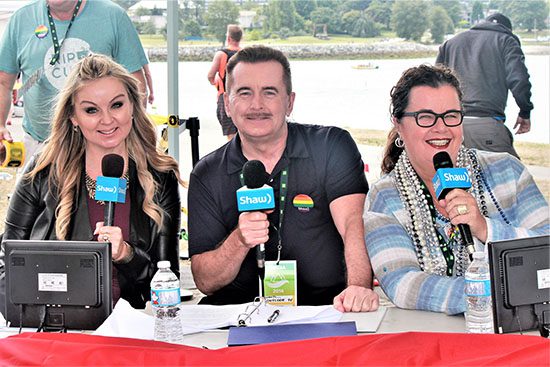
Fiona Forbes, Angus Praught and Barb Snelgrove host the 2016 Vancouver Pride Parade coverage
AP: Were you involved with OutLook TV when it began in Vancouver, the first time around? Can you talk about your role and how it all came about?
MPK: Yes, when Prism moved to the [Kitsilano] office, we renamed it OutLook TV, and I started looking after it. The whole reason we did the magazine-style show, for me, was at that time we only had Xtra West (community newspaper); there was no other media. It was so important for kids who were gay and lesbian to get some kind of access to gay and lesbian information, and to be able to get it on a community channel where they could watch, whether their parents knew or not, so they could get some information to say it’s OK, and don’t end up killing themselves. This was the whole point of why we wanted to do it, and it was so important to do this kind of coverage.
AP: How long did OutLook TV last?
MPK: Ten years; I ended up getting moved over to Metrotown to look after a show called Daytime, and it was then taken over by another producer, then paired down to two-minute segments, and eventually stopped completely.
AP: OutLook TV was brought back again in 2011. How did this happen, and what was your involvement in the relaunch?
MPK: OK, well history repeats itself, and not always in bad ways, but sometimes in good ways. What happened was the North America OutGames were coming to Vancouver, and we decided we were going to do major coverage of it. Part of that legacy, which was similar to what we did in 1990 for the Gay Games, was that we were going to create a half hour magazine-style show, and that’s exactly what happened. Fred Kamperman, who was the community producer in the past, wanted to keep the name OutLook, so we kept it. Fred was the Executive Community Producer, I was the Shaw Producer on the show, and we did half hour shows once a month, for a couple of months. Then, Jack Fox, who was also a producer, said “why don’t we do two half hour shows a month”, so we ended up doing two half hour shows twice a month, and have been doing this for almost six years now, at this point.
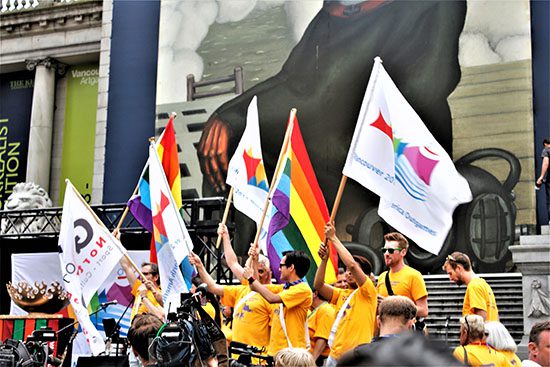
AP: OutLook TV has successfully aired locally in Vancouver, nationally on the OUTtv network, and internationally on YouTube since the relaunch, but recent changes by the CRTC has changed the game somewhat. Can you speak briefly about what kind of change took place?
MPK: Well, what happened was the CRTC, which is the licensing body for community television in Canada, and a number of other things such as telecommunications, decided that the larger centres, the cable companies, were all going to take their larger centres and shut them down, take that money and put it into local news, because local news couldn’t do all the coverage due to costs. So it was a business decision, which I totally understand.
Because community programming was being shut down, OutLook TV moved everything over to OUTtv, Canada’s National LGBTQ Television Network. So, we’re going to continue on OUTtv, which is a good thing, as we will now not have to be so locally focused, and can be a lot broader, across Canada, and even internationally, with OUTtv Go. And one of the really cool things about [Canada] is that it’s really advanced in regards to LGBTQ rights, and other countries want to learn and move towards that. One of the ways they can do this is through OutLook TV.
AP: And finally, can you tell us a little bit about the makeup of OutLook TV, and who will be involved with it going forward?
MPK: OK, so OutLook TV was originally set up as a community access show, which means that it was volunteer-based, and that people can volunteer to help produce stories about their community. Moving forward, we are going to maintain that format, in order to keep the show going in terms of money, and everyone involved is a volunteer. Nobody is making any money, but I feel this is really important to be involved in our community, and to keep getting the word out. Everything is also shifting to digital, and online, and that’s where we’re going as well. As a volunteer-based show, we can keep OutLook TV alive.
AP: Thank you very much for your time, and for giving us an insider’s look at the world of LGBTQ2+ television in Vancouver. We look forward to continue tuning in to OutLook TV on OUTtv, YouTube, and OUTtv GO, as we move forward.
MPK: You’re welcome.
2017 is turning out to be a year of big changes in LGBTQ2+ television in Vancouver, and it will be exciting to stay tuned to developments as they unfold.
Feel free to check out new episodes of OutLook TV, bi-weekly, as they air on the OUTtv network, OUTtv GO, YouTube, and the OutLook TV website.
Angus Praught is president of Gayvan.com Travel Marketing, a Vancouver-based company featuring LGBTQ2+ welcoming destinations, in the Vancouver region, Canada, and beyond.
Sign up for the Out In Vancouver newsletter if you are interested in hearing about more non-heteronormative news, events, and culture that are part of Vancouver’s colourful mosaic. (And to get notified of the latest contests!)










